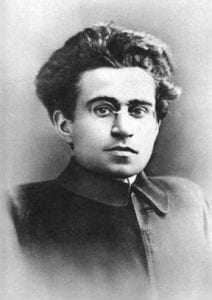By Dr Edoardo Stoppioni, Senior Research Fellow (Max Planck Institute Luxembourg for International, European and Regulatory Procedural Law).
 This post aims at using the work of Gramsci to analyse the hegemonic structures of the discourse of the WTO judge and to disentangle its relation to the neoliberal structural bias of its normative space. The objective is to transpose to international economic law the critical lenses that neo-Gramscian scholars, like Robert Cox, used in international relations. A neo-Gramscian approach focuses on the « material structure of ideology », in order to show how certain norms and practices emerge in a certain context and what is their emancipatory potential concerning a given legal order. By so doing, Cox enlarged the notion of hegemony to include those institutional practices of internalization of a certain ideology and the way they project it externally.
This post aims at using the work of Gramsci to analyse the hegemonic structures of the discourse of the WTO judge and to disentangle its relation to the neoliberal structural bias of its normative space. The objective is to transpose to international economic law the critical lenses that neo-Gramscian scholars, like Robert Cox, used in international relations. A neo-Gramscian approach focuses on the « material structure of ideology », in order to show how certain norms and practices emerge in a certain context and what is their emancipatory potential concerning a given legal order. By so doing, Cox enlarged the notion of hegemony to include those institutional practices of internalization of a certain ideology and the way they project it externally.
Critical doctrines on international law’s “fragmentation” have demonstrated that certain jurisdictions are capable of exercising hegemonic power in the international legal sphere and that a link should be established in that regard with the peculiar bias of economic jurisdictions, such as the WTO judge and the investment arbitrator. The WTO judge is a perfect example thereof (“judge” as, en passant, I find the judicial nature of the mechanism largely demonstrated and recently reaffirmed). As I previously theorized using Gramscian concepts, its discourse constantly oscillates between two poles. The first pole is the one of “prestige” or hegemony via expansion: the judge uses a language of dissemination; it exercises pedagogy to make its own idiom (the language of trade values) the dominating form of legal expression. The second pole is the one of “economism”, or of hegemony via isolation. The judge prefers using a discourse of self-containment to make its power uncontested. It refuses to listen to a foreign language not to put into danger its domination over its own normative regime. (more…)
